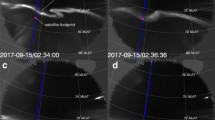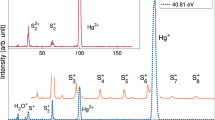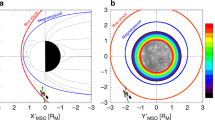Abstract
WE wish to describe briefly some experiments with high-speed neutral atoms produced by the neutralization of positive ions. A homogeneous beam of neutral atoms of mercury, with varying energy, was produced by a method devised by Oliphant1. The fast mercury ions which were pulled out of a hot cathode mercury arc were made to pass through a narrow metallic canal, where a large fraction of them collide with its walls almost at grazing incidence and are neutralized but retain their initial speed. The residual positive ions were filtered out of the mixed emergent beam by an electrostatic field applied between two plates placed beyond the canal.
This is a preview of subscription content, access via your institution
Access options
Subscribe to this journal
Receive 51 print issues and online access
$199.00 per year
only $3.90 per issue
Buy this article
- Purchase on Springer Link
- Instant access to full article PDF
Prices may be subject to local taxes which are calculated during checkout
Similar content being viewed by others
References
Oliphant, M. L., Proc. Roy. Soc., A, 127, 373 (1930).
Author information
Authors and Affiliations
Rights and permissions
About this article
Cite this article
CHAUDHRI, R., KHAN, A. Emission of Secondary Electrons from Nickel and Molybdenum by Neutral Atoms of Mercury and Potassium. Nature 159, 202 (1947). https://doi.org/10.1038/159202a0
Published:
Issue Date:
DOI: https://doi.org/10.1038/159202a0
Comments
By submitting a comment you agree to abide by our Terms and Community Guidelines. If you find something abusive or that does not comply with our terms or guidelines please flag it as inappropriate.



